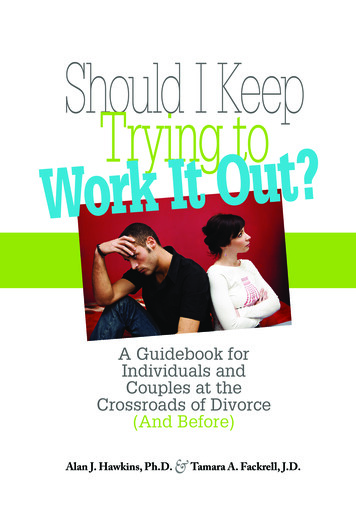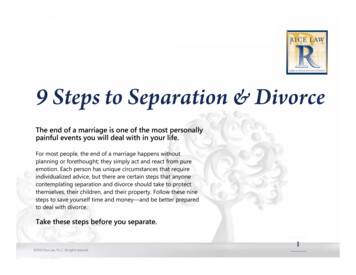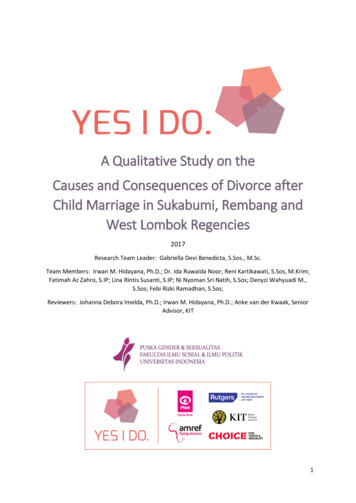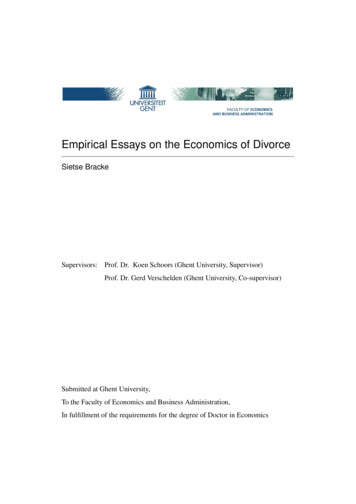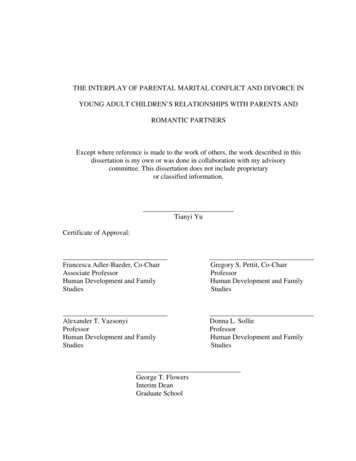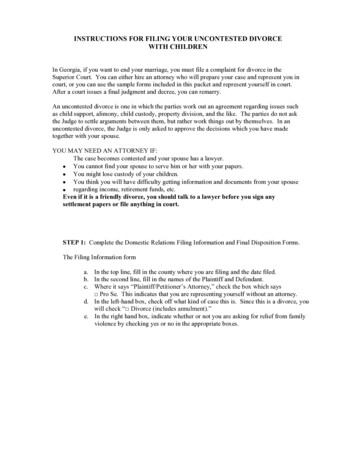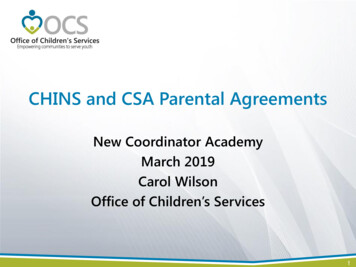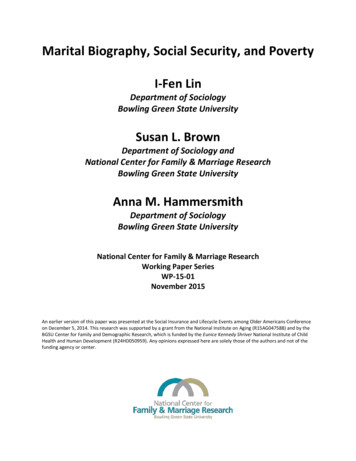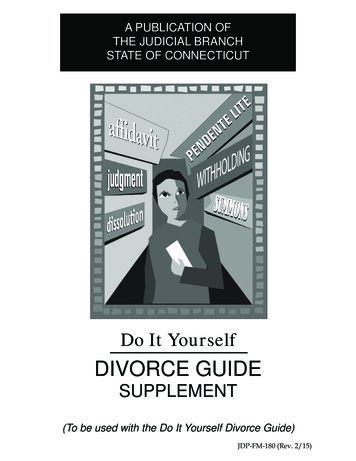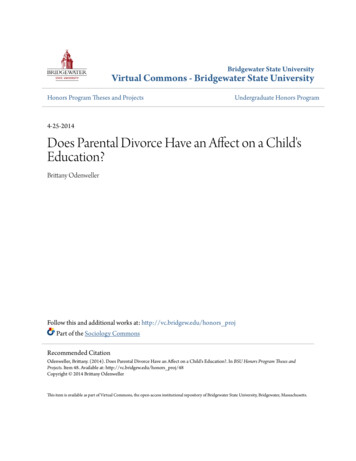
Transcription
Bridgewater State UniversityVirtual Commons - Bridgewater State UniversityHonors Program Theses and ProjectsUndergraduate Honors Program4-25-2014Does Parental Divorce Have an Affect on a Child'sEducation?Brittany OdenwellerFollow this and additional works at: http://vc.bridgew.edu/honors projPart of the Sociology CommonsRecommended CitationOdenweller, Brittany. (2014). Does Parental Divorce Have an Affect on a Child's Education?. In BSU Honors Program Theses andProjects. Item 48. Available at: http://vc.bridgew.edu/honors proj/48Copyright 2014 Brittany OdenwellerThis item is available as part of Virtual Commons, the open-access institutional repository of Bridgewater State University, Bridgewater, Massachusetts.
1Does parental divorce have an affect on a child's education?Brittany OdenwellerSubmitted in Partial Completion of theRequirements for Departmental Honors in SociologyBridgewater State UniversityApril 25, 2014Dr. Jodi Cohen, Thesis DirectorDr. Kim MacInnis, Committee MemberDr. Patricia Fanning, Committee Member
2AbstractIn the U.S., 50 percent of marriages end in divorce. Children who experience theirparents going through a divorce are often left susceptible to depression, acting out,and suffering problems academically. This study examines the relationship betweenacademic problems and parent relationships and divorce. When parents decide todivorce or separate, their actions can affect their children’s education and schooling.The twenty former Abington High School and now Bridgewater State Universitystudents were each interviewed one-on-one to find out if their parents’relationships and conflicts had any affect on their academics. Between the tenstudents who came from divorced parents, and the ten students whose parentswere married, the majority felt that their parent’s negative relationships affectedtheir academics. While the results of this study offer a comparison between theexperiences of children of divorced parents and married parents, the findings showmore similarities than differences.
3IntroductionAcademics are one of the most important aspects of a student’s life. Withgood grades, students are able to get into colleges and universities, and allowthemselves to earn degrees in order to obtain jobs that they want. If the relationshipbetween the student’s parents is unstable and filled with conflict, this can alter thestudent’s academic performance. Divorce rates in the U.S. are at 50% for firstmarriages, and subsequent marriages are 2.5 times more likely to end in divorce(Afifi, 2013; Brown, 2012; Overland, 2012). This leaves many children to gothrough divorce and parental conflict during their school years. Throughconducting interviews with 20 Bridgewater State University students, 10 of whomcome from divorced parents, and 10 of whom come from married parents, Iexamined whether the students who come from divorced parents experience moreacademic trouble than their peers with married parents.This research examines whether these students, who are all graduates ofAbington High School, report that their parent’s divorce has affected theiracademics. It also examines students whose parents are still married and whetherarguing between married parents also caused any changes in their academics.Whether the students come from divorced or married parents, all were able tograduate high school and apply to and be accepted by Bridgewater State University.Literature ReviewChildren of Divorced Parents“In the U.S., it is predicted that 50% of marriages will end in divorce “
4(Overland, 2012). Divorce is now a common act that people do when they no longerwant to be married, but divorce is different when children are involved. “Familyrelationships have become increasingly complex due to rising divorce rates andsubsequent (step) family formation, potentially threatening intergenerationalexchange of family support” (Wijckmans, 2013, 1). When parents go through adivorce, they are not the only ones affected. Divorce affects children in a multitudeof ways. “Ongoing conflict, blocked communication and power imbalances betweenparents are problematic for child and family functioning” (Vanassche, 2013, 3).Children who experience their parents going through a divorce aresusceptible to becoming depressed, being withdrawn, acting out, and actingdifferently. “It is well documented that psychosocial stressors constitute asignificant, pervasive risk for children’s mental health problems” (Velez, 2011, 244).When children experience their parents going through a divorce, the actions of theparents affect the children all throughout their childhood, and eventually mayoverlap into their adulthood. “It is well documented that parental divorce isassociated with multiple problems for youth that extend into adulthood, includinginternalizing and externalizing problems, interpersonal difficulties, poor physicalhealth, and substance abuse” (Sigal, 2012, 150).Divorce RatesAccording to Afifi, “Divorce rates have increased dramatically on a globalscale since the 1960s, particularly in industrialized countries” (Afifi, 2013, 240).This is largely due to changes in attitudes where divorce has become socially
5acceptable, particularly in the U.S. “Perhaps nowhere has this change been morepalpable than in the United States, where anywhere from 40 to 50 percent ofAmericans will experience divorce in their lifetime” (Afifi, 2013, 240). As divorcerates increase, more and more families with children are affected.“Roughly 1 in 4 divorces in 2010 occurred to persons aged 50 and older.Demographic characteristics, economic resources, and the marital biography wereassociated with the risk of divorce in 2010. The rate of divorce was 2.5 times higherfor those in remarriages versus first marriages, whereas the divorce rate declined asmarital duration rose” (Brown, 2012, 731). Many different reasons go into whycouples decide to go through with a divorce. Mullins (2012), explains that“historically, the United States has one of the highest rates of divorce in theindustrialized world” (p. 20). Van Dolen (2013) conducted a study where there wasa telephone and internet help seeking line. Through the study, it was found that“When the divorce rate goes up, the number of calls to the helpline increases” (p. 1).Family IssuesAmato (2014) found that “children with divorced parents, compared withchildren with two continuously married parents, score lower (on average) on avariety of measures of achievement, adjustment, and well-being (p. 370).” Althoughdivorce is a reason why children may negatively act out and feel poorly aboutthemselves, it is not the main reason. As Amato (2014) states:, “Longitudinal studiesmake it possible to compare children before and after parental divorce, assumingthat identical child outcomes are available at both times. These studies have
6demonstrated that many of the child problems typically associated with divorce arepresent years before the divorce occurs (e.g., Sun, 2001). Thus, many of the negativeoutcomes attributed to divorce in cross-sectional studies appear to be due totroubled family relationships (e.g., high levels of marital conflict or ineffectiveparenting) that precede marital disruption rather than to separation itself” (p. 371).Here it is often the conflict and fighting between parents, not the act of divorce itselfthat causes issues for children.There are other factors that contribute to a child’s attitude and emotionssuch as the way parents play a role in their lives. The more positive attention andsupport a child receives from their parents, the stronger the bond will be with theparents. And the stronger the relationship between the parents, the stronger therelationship will be within the entire family. “Because parents select into divorce,the factors that lead parents to end their marriages also may affect childrennegatively, resulting in spurious associations between divorce and child outcomes”(Amato, 2014, 371). The actions of the parents always affect not only themselves,but their children also.When these children of divorced parents grow up, their problems usuallystay with them into adulthood. “As adults, they are also more likely to divorce andbecome single parents themselves than those who grew up in intact families”(Baxter, 2011, 87). Children learn though experience, and how they were raisedduring childhood stays with them when they grow up into adults. If a child grows uponly knowing conflict and arguments within the family and between their parents,they will carry that knowledge into their own lives when they are older and have a
7family of their own.Effects of DivorceDivorce can have both physical and mental effects on children. “The healthconsequences of divorce are also well documented, showing the detrimental effectsof divorce on both somatic [1-5] and mental health [2,6-9], with the divorced orseparated experiencing higher levels of depression, stress, and fear, as well as lowerlevels of self-esteem” (Bracke, 2010, 1). The physical and mental toll of a divorce isastounding. “Compared to the married or cohabiting, the divorced or separated visitprofessional health care providers like general practitioners [21], specialists[21], and psychiatrists [22] more often, and are also hospitalized more often[21,25]” (Bracke, 2010, 1). In thinking about how divorce affects adults, it isimportant to remember that when divorced adults are hospitalized and seekingmedical care that this has an effect on their children as well.Molepo (2012) explains that “the findings suggest that teachers perceiveyounger children from divorced parents were more likely to have emotional andbehavioural challenges than those from intact families” (p. 251). As Baxter (2011)states, “It is therefore not surprising that the elevated risk of adjustment problemsapparent for children whose parents have separated are frequently linked to theirexperiences of significant pre-separation conflict” (p. 87). Van Dolen (2013) alsofinds that, “Experiencing parental divorce during childhood is associated withincreased likelihood of being subject to child abuse and/or witnessing violence”(p.1). When parents go through a divorce, the children can become witness to what
8it brings about in their parents, and sometimes even unknowingly get in the middleof it.Children who get caught up in their parents divorce are likely to suffergreater stresses than those who do not become involved. “Compared to those fromintact families, children of separated parents show poorer outcomes in multipledomains “ (Lucas, 2013, 53). A parents’ choice to divorce brings on a slue of issuesfor the children. “While parental separation may bring about relief from exposure tovery frequent and intense conflict between parents, it also tends to create a range ofother disruptions” (Baxter, 2011, 87). In a study done by van Dolen (2013), he foundthat, “higher levels of misbehavior and aggression, higher risk of committing suicide,less competence, more under-controlled behavior, poorer academic performanceand reduced likelihood of participating in tertiary education” (p.1).Baxter (2011) then goes on to explain these disruptions, stating, “immediateupheavals may include substantial increases in financial difficulties and associateddeprivations, changes in housing and school, enhanced parental distress and/ordiminished quality of parenting, and substantially reduced time or even total loss ofcontact with one parent. Such disruptions can be very distressing for the children”(p. 87). Baxter (2011), explains further that children of divorce suffer moreemotional and social problems than those of intact families. Mullins (2012) alsofinds that children of divorce experience greater problems explaining that, “thepersonal, social, and economic consequences of marital disruption on formerpartners, their children, and American society in general are both pervasive andcontinuing” (p. 20).
9Child CustodyAnother major problem that can arise when parents get a divorce, is whetherthe parents get sole or shared custody of the children. This custody battle can causeissues for not only the parents, but for the children themselves. Having to beshuffled back and forth between parents can really take a toll on children. Custodyissues can also cause problems if one parents wants or gains sole custody, but thechildren do not want to be with said parent. Patel (2014), states “the U.S. CensusBureau (2011) reported that nearly 46% of children do not live with both biologicalparents” (p. 18). Patel (2014) goes on to explain that 10 percent of separatingparents disagree on custody and visitation, and this ultimately leads to legal battlesand use of the courts. These legal battles over the children may cause the childrento feel like they are being forced to choose sides. Children may feel that if theychoose one parent over the other, the other parent may not want to be involved intheir life.Klass (2014) states that “in the middle years of child development, this issuebecomes more decisive in affecting a child’s moral compass. By living with a parent’scertain level of morality, a child becomes indelibly influenced by that parent’sbehavior” (p. 8). The age of the child also comes into play when dealing with parentsand custody battles. The younger a child is, the more they can be easily influencedand swayed to believe what one parent may want them to think and believe. Yet theolder the child gets, the more they can see what is right and what is wrong, and theyare then able to make their own decisions about their parents.
10RemarriagesWhen parents get divorced, they now have the option to remarry. As Whitton(2013) states, “in the past 25 years, remarriage has become increasingly common. In2000 – 2001, remarriages represented around 29% of existing marriages” (p. 276),and more recently that number has increased. Remarriage among parents can eitherbe a good or bad thing, depending on how the parents deal with it. Yet, as discussedearlier, Brown (2012) explains that the divorce rate for second marriages is 2.5times higher than that of first marriages, which means that children can be forced togo through divorce again after a parent remarries. Whitton (2013) goes on to statethat “because they have experienced firsthand that marriage did not last forever,that they were able to make it through a divorce, and that they were able to form anew relationship after ending their first marriage, remarried people may be morewilling and more likely to choose divorce as a way to handle problems in theirremarriage” (p. 277). When parents decide to remarry, the marriage has an effect onthe children and their feelings and emotions. Parents who remarry and then deicideto get another divorce are only creating more problems for themselves and theirchildren.Also, parents who decide to remarry are also combining families andchildren. These children may not get along, and can clash with each other. The samegoes for children who have to learn to adjust to having a new parental figure in theirlife. Children may not want to have to obey the rules set out by their new stepparent and may resent them. Whitton (2013) explains that “remarried adults,whether or not they brought children from a previous union into the remarriage,
11reported marital quality (happiness and conflict) equal to those in first marriages.They also reported more positive attitudes toward divorce, which were associatedwith higher divorce proneness” (p. 276).At the same time, remarriage can be a good thing among families.Higginbotham (2013) states that “the consistency of remarriage-related cognitionsbetween stepfamily members has been posited to be of ‘primary importance’ infunctional stepfamily systems”. When a parent gets remarried, it can benefit notonly the parent, but also the children. The child may actually find themselvesbonding with the stepparent, or even accepting the stepparent as their own parent.When parents remarry, the family’s economic status may also be improved, nowthat two incomes may come into the household. Children may also come to havenew stepsiblings. Stepsiblings can both be a positive and a negative to children. If achild gets along with his or her stepsiblings, new bonds can be formed, and childrenwill have new friends and siblings to be able to talk and play with. But if children donot get along with their stepsiblings, this can cause problems within the family.Fighting among stepsiblings can cause the parents to evaluate whether theirmarriage was the right idea or not.Conflict Within Intact MarriagesEmotional and physical damage to families and children do not only occur toparents going through a divorce. Parents who are still married, yet fight constantlyalso contribute to the emotional and physical damage done to children andthemselves. “Regardless of whether separation takes place, processes associatedwith deteriorating relationships between parents are also likely to impact
12negatively on the children” (Baxter, 2011, 87). Parents who believe that they aredoing a good thing by staying together, whether it is for financial, or appearancereasons, can often do more harm than good. It is not healthy for children to live in anenvironment where conflict and arguments are constantly taking place. “There issome evidence to suggest that of children exposed to high levels of inter-parentalconflict, those whose parents remain together tend to indicate poorer adjustmentthan those whose parents separate” (Baxter 2011, 87).However, some parents may actually benefit from getting a divorce, as tostop the conflict between them that harms the children so much. “Exposure toparental conflict may also explain poor child mental health after parentalseparation” (Lucas, 2013, 54). Even when parents get a divorce and that experiencestays with children far into their adulthood, the conflict between parents also stayswith the child into adulthood. “There is consistent evidence that exposure to highlevels of parental conflict has negative and long-lasting effects on child development(Lansford, 2009), with reviews (Amato, 1993) indicating that parental conflict ismore consistently related to child post-separation adjustment than any other factor,including separation itself” (Lucas, 2013, 55).The separation itself can bring on more problems for a child, but it does notmean that the conflict between the parents does not. Children notice when parentsare not getting along, and they can remember the actions that the parents tookwhen engaging in conflict. “Regardless of whether parents were together orseparated, children whose parents had a hostile relationship had poorer emotionalwellbeing than those whose parents did not have a hostile relationship. (Lucas,
132013, 55). The emotional wellbeing of children who experienced their parentshostilities affects their social relationships as they grow into adulthood.Options for HelpChildren whose parents are going through a divorce do not have to sufferalone. There are programs and organizations that help children cope with divorce.“There are a number of preventive interventions designed to improve children’sadaptation after parental divorce” (Sigal, 2012, 150). Sigal (2012) goes on to explainhow academic intervention programs for children from divorced families have hadsuccess in changing the academic outcomes for these children. These programs havebeen put into place in order to keep children whose parents have gone through adivorce from straying away, and help children create and achieve goals, and providethem with the support that they may not feel that they have at home.It is crucial to get children the help that they need when going throughdivorce and parent conflict. Willemijn (2013) states that, “childhood is characterizedas a vulnerable period in which many young people experience distress. Being ableto cope with this by seeking help is important for a healthy transition to adulthood(Schonert-Reichl & Muller, 1996); if children receive help when they are in distress,troubled behaviors such as violence, substance abuse, and suicide may be reduced”(p.1). Children are very vulnerable when parents are going through divorce becausethey do not have their parents to turn to for help. Intervention programs that limitthe negative social outcomes are important to protect children when they are attheir most vulnerable.
14MethodologySubjects/SampleThe subjects in this study are Bridgewater State University students whohave either divorced parents, or parents that are still currently married. Eachstudent consented to take part in the study. The students were informed of thestudy through recruitment by the researcher and by snowball sampling. The firstparticipants were all personally asked if they would participate in the study, and allagreed to it.All 20 subjects are graduates of Abington High School, and are all currentstudents of Bridgewater State University. All of the subjects are over the age of 18.Snowball sampling was used to locate and recruit subjects. I started with friendsand asked them to reach out to other friends and students in order to find willingparticipants. Through snowball sampling I was able to find 20 former Abington HighSchool students who are also current BSU students to interview. Ten of thesestudents come from families where the parents are divorced, and ten come fromfamilies where the parents are still married, giving me equal groups. Twelve of thestudents are female, while eight are male. Table 1 shows the students name, theircurrent year at BSU and if their parents are divorced or still married. The student’snames have been changed as to keep the students identity private.
15Table 1Name of StudentCurrent Year at iorFreshmanSeniorJuniorSophomoreSophomoreDivorced or vorcedDivorcedSettingThis study took place at Bridgewater State University (BSU) in Bridgewater,Massachusetts during the Spring 2014 semester. Bridgewater is located in PlymouthCounty, in Southeastern Massachusetts. The town of Bridgewater consists of 26,000residents. Bridgewater State University is located inside of the town of Bridgewater,and is a public state university. BSU is a majority commuter school, with most of itsstudents being from the Southeastern region of Massachusetts. The data collectiontook place in various locations around the BSU campus. Some interviews took placein the Maxwell Library, while others took place in other academic buildings such asBurnell and Hart Hall. The locations for the interviews were based on the student’s
16academic schedule and availability. The length of the interviews were different foreach student, depending on how long they wanted to take answering questions.Research Questions1. Does the divorce of one’s parents affect student’s academics?2. Does parental fighting (outside of divorce) in the home affect students’academics?3. Do students with married parents experience trouble with theiracademics when their parents fight?4. Do students with married parents experience fewer academic problemsthan their peers with divorced parents?5. Do students with married parents with an unstable relationshipexperience problems with their academics?6. Do students with married parents with an unstable relationship reportthe cause of their academic troubles as coming from their parentsfighting, or other factors?7. Are there differences in student’s academics for those with marriedparents compared with those with divorced parents?8. Are there differences in student’s academics for those with fightingparents compared with those whose parents (both married and divorced)are not fighting?
17InstrumentsFor the data collection, I used a set of open-ended interview questions.Before conducting the interviews, each student was given an informed consent formthat they could read and sign if they chose to participate in the study. The informedconsent form assured the students that all of the data collected would be keptconfidential, that the student’s identities would remain anonymous, and that theycould choose leave the study at any point.Open-Ended InterviewsThe data that was used in this study was collected through open-endedinterview questions. I chose to use open-ended questions so that the students wouldfeel comfortable answering, and allowing themselves to divulge as much or as littleinformation as they wanted. The open-ended interviews are qualitative, whichmeans that their answers cannot be quantified.I designed two lists of interview questions, one list for students who haveparents that are still married (Appendix A), and a list of interviews for students whohave divorced parents (Appendix B). Some questions were the same for bothgroups, and other questions were different. There were seven questions for eachinterview.Each interview was recorded via audio on my laptop. There was no set timeframe for the interviews, the students were allowed as much or as little time as theyneeded to respond to the questions. I also took short hand notes on my laptopsimultaneously.
18LimitationsFor this study, there were several limitations. One limitation is that the studyonly uses 20 students, all who came from the same high school and who are allcurrently students of the same college (BSU). The sample size does not accuratelyrepresent the population of the school, or the larger population.Another limitation of the study is that all students are over the age of 18, andare all college students. None of the students are under the age of 18, and none ofthe students are high school students. The study only focused on current collegestudents. Most of these students are reporting what they remember from whentheir parents divorced during their earlier childhood years. These memories maybe less accurate than interviewing students currently going through divorce in theirfamilies.Findings & DiscussionR1: Does the divorce of one’s parents affect student’s academics?Students whose parents go through a divorce are likely to experience sometype of disturbance in their academic careers. Literature has previously shown thatyouth who experienced parental divorce attain lower levels of education (Sigal,2012). Of the 20 students that were interviewed, four commented on how theiracademics were affected in regards to their parents divorce.When asked if parent’s divorce affected the student’s academics, Emily, asenior commented on her experience. She stated that:
19My parents divorced when I was in the sixth grade. I remember it was atough year, so when I went to junior high, I was in all level two’s. At the time Idid not understand why because I knew I was smart. But I was told that sinceI had a bad year in sixth grade, they made seventh grade easier. That mademe upset.When asked the same question, Drew, a sophomore also commented on hisexperience when his parents divorced. He responded with:My parents divorced before I was two. I guess this couldn’t affect my gradesat the time, but looking back throughout my schooling, I can now see wheremy grades dropped, around eight grade, and eleventh grade. Both times myparents tried to reconcile, both times they failed. Makes sense now.Both Emily and Drew had the same type of realization, that they did notknow in the moment that their grades and schooling were being affected, butrealized years later when they were asked. When recalling their schooling andparents divorce, both students seemed to have a sense of awe, not being aware thattheir schooling was affected at the time, but only now realizing when looking backon it.The other two students however did notice at the time that their grades andacademics were affected. When asked if the divorce of their parents affected theiracademics, one student, Meredith, a senior, commented on how her parents hadbeen divorced for many years, but did notice that her grades were affected when herfather and step mother fought. She stated that:My parents have been divorced for so many years, with my dad nowremarried. My parents never really fight because they never see each other,but I do notice when my dad fights with his new wife. I don’t think this hascaused my grades to drastically suffer, but when they fight, I do notice a badtest grade or two.
20The second student, Nick, also a senior, commented on how his academicswere directly affected because of his parents divorce, however much moredrastically. When asked the question, Nick responded with:My parents only divorced about two years ago. It was probably the worstyear or two of my life. I ended up breaking up with my girlfriend, and mygrades totally went down the shitter. I just wanted to be alone.In my research I was able to find a relationship between the divorce itself,and students’ reported academic outcomes.R2: Does parental fighting (outside of divorce) in the home affect students’academics?According to previous research, literature has stated that, regardless ofwhether separation takes place, processes associated with deterioratingrelationships between parents are also likely to impact negatively on the children(Baxter, 2011). Out of the 20 students interviewed, 14 of the students mentionedthat their academics suffered one way or another when their parents fought. 8 of the14 students came from a household with divorced parents, while the other 6 camefrom a household where the parents were still married.All of the students who come from divorced families commented on how it isnot the fighting over the divorce itself, but rather the fighting between theirseparated parents are over other matters that caused iss
of divorce on both somatic [1-5] and mental health [2,6-9], with the divorced or separated experiencing higher levels of depression, stress, and fear, as well as lower levels of self-esteem" (Bracke, r s r, ). The physical and mental toll of a divorce is astounding. "Compared to the married or cohabiting, the divorced or separated visit
